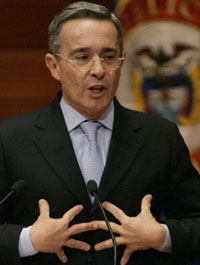Bogotá, February 17, 2010—Colombian President Alvaro Uribe Vélez said on Tuesday that those who illegally spy on the press are “enemies of his government” during a meeting with a delegation from the Committee to Protect Journalists and the Foundation for Freedom of the Press (FLIP).
Uribe issued the statement at the urging of the CPJ and FLIP delegation, which met with the president and top government officials including Vice President Francisco Santos; Minister of Interior Fabio Valencia Cossio; Felipe Muñoz, the director of national intelligence, or DAS; the director of the national police, General Oscar Naranjo Trujillo; and other high-ranking officials in a two-hour-long meeting at the presidential palace, known as Casa Nariño.
On Tuesday morning, CPJ and FLIP presented their annual reports during a press conference at the Javeriana University in Bogotá. According to both reports, illegal espionage of journalists is one of the most serious threats to press freedom in Colombia. Local reporters had their phones intercepted, their e-mails hacked and were subjected to surveillance and harassment during a period from 2004 to 2006. CPJ had its e-mails hacked. According to initial investigations and journalists’ allegations, illegal spying may have stretched beyond February 2009 after the news of the scandal broke, CPJ and FLIP said.
The delegation asked President Uribe to make a strong statement in response to ongoing concerns about illegal spying. The president reiterated that Colombia is a democratic government that “does not accept illegality.” Uribe said that “those who restrict the freedom of a journalist and illegally spy on the press are enemies of my government.”
The delegation included CPJ board member María Teresa Ronderos, one of Colombia’s most prominent journalists, former CPJ awardee Ignacio Gomez, president of FLIP, CPJ Americas Senior Program Coordinator Carlos Lauria, and FLIP Executive Director Andres Morales.
The CPJ and FLIP delegation told Uribe and Colombian officials that journalists are taking extraordinary steps to prevent their communications from being intercepted, and called on authorities to prosecute all those responsible. “It really hurts me that those responsible have not been captured,” said Uribe. General Naranjo said that the national police shared the president’s frustration with the investigation, but insisted that great efforts have been made.
As a result of the widespread espionage scheme, confidential sources have been endangered and have become reluctant to talk to Colombian journalists, CPJ and FLIP said. Uribe stated that his government will not allow “any act that interferes with the work of the press.” Vice President Santos said the government “will assume its responsibility based on firm judicial sentences.”
Since the scandal broke, the attorney general’s office launched an inquiry that resulted in the 2009 arrests of several top intelligence officials, including former DAS Deputy Director José Miguel Narváez. In all, 40 DAS officials are now being investigated. Seven were indicted in January and may soon stand trial. “Those who restrict the freedom of a journalist must be fully prosecuted,” said Uribe.
During the meeting with Attorney General Guillermo Mendoza Diago on Monday, the delegation also spoke with Colombia’s Public Prosecutor Alejandro Ordoñez. Ordoñez’s office is investigating 26 officials who have been involved in the scheme, and has the power to impose disciplinary actions. Among them, Ordoñez told the delegation, were three top officials at the president’s office.
While the names of the president’s advisors were released by the public prosecutor’s office in June, Uribe defended the officials and said that he rejected any pressure from the media to “criminalize innocent people.” Uribe said he worried that the lack of concrete results in the investigation has made room for political manipulation of his government.
Both the interior minister and the DAS director, who met with the delegation on Monday, issued statements reacting to the reports. Both statements reasserted that illegal espionage was not state policy, and that they have assisted in the investigation.
The delegation also urged authorities to abstain from accusing members of the media of having links to armed groups without any evidence because it endangers the lives of reporters.
